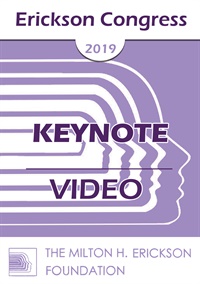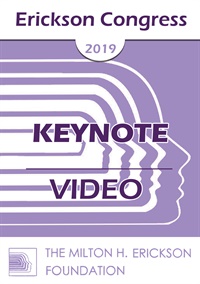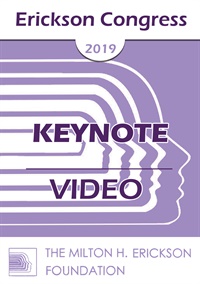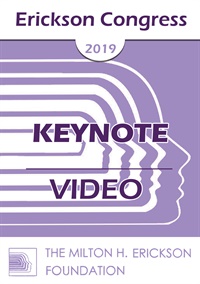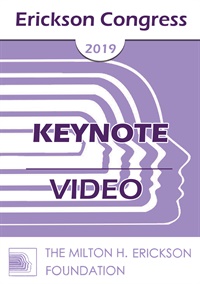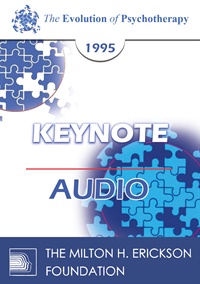
- Average Rating:
- Not yet rated
- Topic Areas:
- Keynotes | Psychotherapy | Therapeutic Relationship | Therapist Development
- Categories:
- Evolution of Psychotherapy | Evolution of Psychotherapy 1995
- Faculty:
- Gloria Steinem
- Duration:
- 1 Hour 23 Minutes
- Format:
- Audio Only
- Original Program Date:
- Dec 17, 1995
- Short Description:
- This address describes the interaction of a client and therapist and how psychotherapy encourages growth.
- Price:
- $15.00 - Base Price
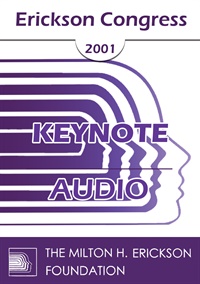
- Average Rating:
- Not yet rated
- Topic Areas:
- Keynotes
- Categories:
- Erickson Congress 2001 | Erickson Congress
- Faculty:
- Jeffrey Zeig, PhD
- Duration:
- 56:35
- Format:
- Audio Only
- Original Program Date:
- Dec 05, 2001
- Short Description:
- IC01 Keynote 01 - Celebrating Erickson - Jeffrey K. Zeig, PhD Although patterns of Erickson's methods have been elucidated in the literature, many remain obscure. Using videos from the Erickson Foundation Archives, Zeig will describe complex patterns and indicate potential uses in psychotherapy.
- Price:
- $15.00 - Base Price
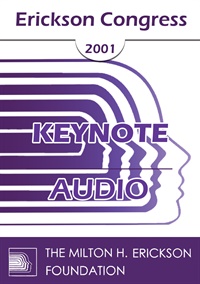
- Average Rating:
- Not yet rated
- Topic Areas:
- Keynotes
- Categories:
- Erickson Congress 2001 | Erickson Congress
- Faculty:
- Steven Lankton, MSW, LMFT, DAHB | Kellen King, MA
- Duration:
- 53:44
- Format:
- Audio Only
- Original Program Date:
- Dec 06, 2001
- Short Description:
- IC01 Keynote 02 - The Basic Footprint of Erickson's Work - Steven Lankton, MSW, LMFT, DAHB and Ellen King, MA The Basic Footprint is a model of change that represents and identifies Erickson's method for change. It is a general umbrella under which we should be able to place any step of change or intervention. Encounters that follow the Basic Footprint create change and any therapy that steps through these stages reflects Erickson's approach and echoes his legacy. A description of the Basic Footprint includes the steps: matching, blending, utilizing, introducing ambiguity, reframing and co-creating outcomes.
- Price:
- $15.00 - Base Price
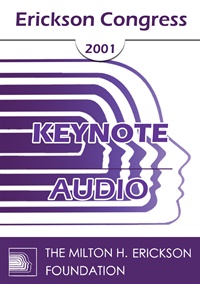
- Average Rating:
- Not yet rated
- Topic Areas:
- Keynotes
- Categories:
- Erickson Congress 2001 | Erickson Congress
- Faculty:
- Ernest Rossi, PhD
- Duration:
- 1:02:06
- Format:
- Audio Only
- Original Program Date:
- Dec 07, 2001
- Short Description:
- IC01 Keynote 03 - Novelty, Gene Expression and Neurogenesis - Ernest Rossi, PhD This is a practical, personal growth workshop demonstrating how the new neuroscience principles of novelty, enrichment and physical exercise can be facilitated with creative replay and reframing as the fundamental dynamics of Erickson's work.
- Price:
- $15.00 - Base Price
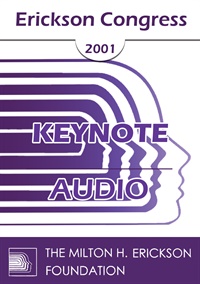
- Average Rating:
- Not yet rated
- Topic Areas:
- Keynotes | Psychotherapy | Social Issues | Humanistic Therapy | Systems Thinking
- Categories:
- Erickson Congress 2001 | Erickson Congress | Pioneers in Couples and Family Therapy
- Faculty:
- Cloe Madanes, HDL, LIC
- Duration:
- 1:01:26
- Format:
- Audio Only
- Original Program Date:
- Dec 08, 2001
- Short Description:
- Cloe Madanes shares her journey and insights, urging therapists to embrace their roles as humanist social activists. Drawing from her work in strategic and family therapy, she addresses issues like violence, sexual abuse, and institutionalization. She critiques the medicalization of therapy and the influence of managed care, advocating for ethical, human-centered practice rooted in social responsibility and emotional healing.
- Price:
- $15.00 - Base Price
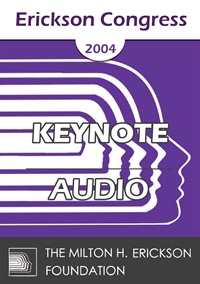
- Average Rating:
- Not yet rated
- Topic Areas:
- Keynotes | Psychotherapy | Ericksonian Hypnosis and Therapy Techniques | Managed Care | Systems Theory | Psychopharmacology
- Categories:
- Erickson Congress | Erickson Congress 2004 | Pioneers in Couples and Family Therapy
- Faculty:
- Cloe Madanes, HDL, LIC
- Duration:
- 53:36
- Format:
- Audio Only
- Original Program Date:
- Dec 02, 2004
- Short Description:
- This keynote traces the shift in psychotherapy from systemic approaches to the rise of managed care and psychopharmacology. It critiques profit-driven models and the overuse of medication, especially in cases involving children removed from families. Emphasizing the importance of family therapy and community involvement, it promotes ethical, value-driven practice and highlights success stories where systemic interventions led to lasting change.
- Price:
- $15.00 - Base Price
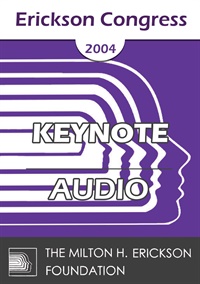
- Average Rating:
- Not yet rated
- Topic Areas:
- Keynotes | Neuroscience | Hypnosis | Psychotherapy | Genomics
- Categories:
- Erickson Congress | Erickson Congress 2004
- Faculty:
- Ernest Rossi, PhD
- Duration:
- 53:35
- Format:
- Audio Only
- Original Program Date:
- Dec 03, 2004
- Short Description:
- The implication of current research in neuroscience is that psychological experiences of novelty, enrichment, and exercise activate gene expression and brain plasticity (growth) in therapeutic hypnosis and psychotherapy. What does this mean for the actual clinical practice and rehabilitation as well as creative everyday living?
- Price:
- $15.00 - Base Price
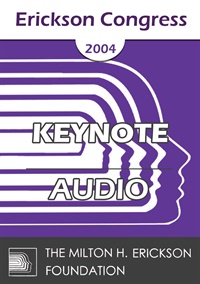
- Average Rating:
- Not yet rated
- Topic Areas:
- Keynotes | Consciousness | Naturalistic | Hypnosis | Trance | Generative Psychotherapy
- Categories:
- Erickson Congress | Erickson Congress 2004
- Faculty:
- Stephen Gilligan, PhD
- Duration:
- 1:03:54
- Format:
- Audio Only
- Original Program Date:
- Dec 04, 2004
- Short Description:
- The process of human growth and development occurs through a series of identity cycles. The transition from one identity level to the next is precipitated by extraordinary experiences, positive or negative in nature, that destabilize the ordinary state of consciousness. The result is a naturalistic trance or special learning state. If properly utilized, these trances lead to new, more evolved states of human being; but if not welcomed and received, violence and other forms of destructive pathology result. This address will examine this process in detail, and discuss implications for development at individual, group, and cultural levels.
- Price:
- $15.00 - Base Price
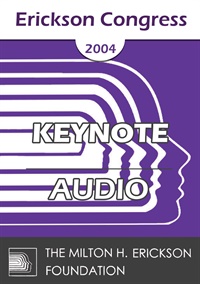
- Average Rating:
- Not yet rated
- Topic Areas:
- Keynotes | Hypnosis | Therapist Development
- Categories:
- Erickson Congress | Erickson Congress 2004
- Faculty:
- Jeffrey Zeig, PhD
- Duration:
- 58:49
- Format:
- Audio Only
- Original Program Date:
- Dec 05, 2004
- Short Description:
- Hypnosis is commonly thought of as a tool to enhance the therapy. It also can be used as a "lens." The phenomenology of hypnosis can help us to understand an essential aspect of the trance state, the symptom state, the solution state and the therapist's state, thereby providing new options for treatment.
- Price:
- $15.00 - Base Price
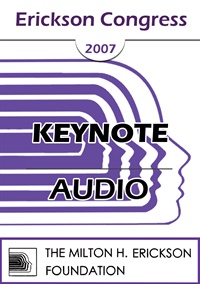
- Average Rating:
- Not yet rated
- Topic Areas:
- Keynotes | Hypnosis | Positive Psychology
- Categories:
- Erickson Congress | Erickson Congress 2007
- Faculty:
- Michael Yapko, PhD
- Duration:
- 1:03:33
- Format:
- Audio Only
- Original Program Date:
- Dec 08, 2007
- Short Description:
- Blending humor, neuroscience, and clinical insight, this keynote explores what positive psychology can learn from hypnosis about focus, perception, and human potential. The talk shows how hypnotic principles—attention, suggestion, imagination, and expectancy—can deepen the science of well-being and foster authentic change. With vivid examples, including work with elephants at the San Diego Wild Animal Park, it illustrates how compassion, mindfulness, and learned optimism can expand both personal and therapeutic effectiveness.
- Price:
- $15.00 - Base Price
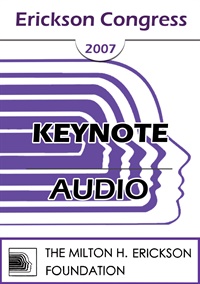
- Average Rating:
- Not yet rated
- Topic Areas:
- Keynotes | Neuroscience | Psychotherapy | Art and Creativity | Naturalistic | Utilization
- Categories:
- Erickson Congress | Erickson Congress 2007
- Faculty:
- Ernest Rossi, PhD
- Duration:
- 55:13
- Format:
- Audio Only
- Original Program Date:
- Dec 08, 2007
- Short Description:
- The Bioinformatics of Enchanting Effectiveness is the scientific foundation of Milton H. Erickson's naturalistic and utilization approach to therapeutic hypnosis and psychotherapy via the psychosocial facilitation of gene expression and brain plasticity.
- Price:
- $15.00 - Base Price
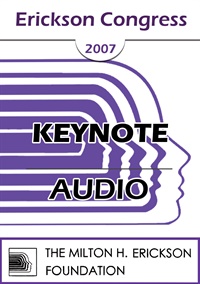
- Average Rating:
- Not yet rated
- Topic Areas:
- Keynotes | Hypnosis | Psychotherapy
- Categories:
- Erickson Congress | Erickson Congress 2007
- Faculty:
- Jeffrey Zeig, PhD
- Duration:
- 1:13:22
- Format:
- Audio Only
- Original Program Date:
- Dec 08, 2007
- Short Description:
- This tribute is a retrospective look at the contributions that Jay Haley made to both psychotherapy and hypnosis.
- Price:
- $15.00 - Base Price
- Average Rating:
- Not yet rated
- Topic Areas:
- Keynotes | Ericksonian Hypnosis and Therapy Techniques
- Categories:
- Erickson Congress | Erickson Congress 2011
- Faculty:
- Helen Erickson, PhD, MSN, AHN-BC, FAAN, SGAHN
- Course Levels:
- Master Degree or Higher in Health-Related Field
- Duration:
- 54:21
- Format:
- Audio and Video
- Original Program Date:
- Dec 08, 2001
- Short Description:
- This presentation explores Ericksonian concepts that provide a base for modeling the client’s world view, and role-modeling interventions that deal with physio-psychological problems. Related personal life experiences, professional practice and related research will be used to illustrate.
- Price:
-
Sale is $29.00
price reduced from Base Price - $59.00
- Average Rating:
- Not yet rated
- Topic Areas:
- Consciousness | Keynotes | Research | Neuroscience | Hypnosis | Psychotherapy | Mind-Body | Pain and Healing
- Categories:
- Erickson Congress | Erickson Congress 2011
- Faculty:
- Ernest Rossi, PhD
- Course Levels:
- Master Degree or Higher in Health-Related Field
- Duration:
- 55:38
- Format:
- Audio and Video
- Original Program Date:
- Dec 08, 2011
- Short Description:
- Creative Psychosocial Genomics is proposed as the new foundation that underpins the neuroscience of therapeutic hypnosis and many psychotherapies. Currently it is the only evidence-based molecular-genomic approach to mind-body healing and problem solving that that facilitates (1) stem cell activation and a reduction of (2) chronic inflammation & (3) cellular oxidation.
- Price:
-
Sale is $29.00
price reduced from Base Price - $59.00
- Average Rating:
- Not yet rated
- Topic Areas:
- Keynotes | Psychotherapy | Utilization | Ericksonian Hypnosis and Therapy Techniques
- Categories:
- Erickson Congress | Erickson Congress 2011
- Faculty:
- Stephen Gilligan, PhD
- Course Levels:
- Master Degree or Higher in Health-Related Field
- Duration:
- 52:23
- Format:
- Audio and Video
- Original Program Date:
- Dec 10, 2011
- Short Description:
- The most radical and enduring contribution of Milton Erickson to psychotherapy was the principle of utilization, which states that whatever a client presents, including negative experiences, can be positively used for therapeutic change. This presentation offers a theoretical framework for understanding how and why utilization is a generative principle in psychotherapy, emphasizing ideas of archetypal patterns, psychological sponsorship, deep structures vs. surface structures, and the central of role of skillful human presence in creating value in any experience.
- Price:
-
Sale is $29.00
price reduced from Base Price - $59.00
- Average Rating:
- Not yet rated
- Topic Areas:
- Keynotes | Art and Creativity
- Categories:
- Erickson Congress | Erickson Congress 2011
- Faculty:
- Jeffrey Zeig, PhD
- Course Levels:
- Master Degree or Higher in Health-Related Field
- Duration:
- 48:47
- Format:
- Audio and Video
- Original Program Date:
- Dec 11, 2011
- Short Description:
- Expressive elements in the work of Beethoven and Erickson will be compared. Mood and perspective are impacted by expressive elements, not by information.
- Price:
-
Sale is $29.00
price reduced from Base Price - $59.00
Tags: Art and Creativity Music
- Average Rating:
- Not yet rated
- Topic Areas:
- Keynotes | Hypnosis | Ericksonian Hypnosis and Therapy Techniques | Milton Erickson
- Categories:
- Erickson Congress | Erickson Congress 2019
- Faculty:
- Roxanna Erickson Klein, RN, PhD, LPC, LCDC
- Course Levels:
- Master Degree or Higher in Health-Related Field
- Duration:
- 59 Minutes
- Format:
- Audio and Video
- Original Program Date:
- Dec 12, 2019
- Short Description:
- This Keynote event offers a historical perspective of how Milton Erickson’s views of hypnosis evolved over a lifetime. By reviewing publications from his early works in the 1920s over the next half century Roxanna summarizes shifts on style and emphasis and emphasis. Using this framework, attendees can gain a deeper appreciation for the evolution of Erickson’s ideas as we self-reflect on the professional growth process and our own development.
- Price:
-
Sale is $29.00
price reduced from Base Price - $59.00
- Average Rating:
- Not yet rated
- Topic Areas:
- Keynotes | Ericksonian Hypnosis and Therapy Techniques | Future Oriented | Milton Erickson
- Categories:
- Erickson Congress | Erickson Congress 2019
- Faculty:
- Michael Yapko, PhD
- Course Levels:
- Master Degree or Higher in Health-Related Field
- Duration:
- 59 Minutes
- Format:
- Audio and Video
- Original Program Date:
- Dec 11, 2019
- Short Description:
- This keynote explores Milton Erickson’s enduring influence through the lens of future orientation in psychotherapy. It examines how time perspective shapes depression, anxiety, resilience, and meaning, and how hypnosis can help clients shift from rumination to purposeful action. Integrating neuroscience, discrimination training, and positive psychology, the talk invites therapists to think beyond the moment, using realistic hope, foresight, and preventive focus to create meaningful change for individuals and society.
- Price:
-
Sale is $29.00
price reduced from Base Price - $59.00
- Average Rating:
- Not yet rated
- Topic Areas:
- Keynotes | Ericksonian Hypnosis and Therapy Techniques | History of Psychotherapy | Metaphors | Utilization | Experiential Therapy | Unconscious Processes
- Categories:
- Erickson Congress | Erickson Congress 2019
- Faculty:
- Stephen Lankton, MSW
- Course Levels:
- Master Degree or Higher in Health-Related Field
- Duration:
- 54 Minutes
- Format:
- Audio and Video
- Original Program Date:
- Dec 12, 2019
- Short Description:
- Dr. Milton Erickson graduated from the University of Wisconsin’s School of Medicine in 1925. During the ensuing 55 years of his career, Erickson was devoted to researching, practicing, learning, refining, teaching, and publishing the lessons borne of his creative intuition and experience. And over the years his practices evolved. The last two decades of his life, and even more so in the 40 years since his death, through the efforts of those he influenced the number of ideas and interventions attributed to Erickson proliferated abundantly.
- Price:
-
Sale is $29.00
price reduced from Base Price - $59.00
- Average Rating:
- Not yet rated
- Topic Areas:
- Keynotes | Psychotherapy | Therapist Development
- Categories:
- Erickson Congress | Erickson Congress 2019
- Faculty:
- Scott Miller, PhD
- Course Levels:
- Master Degree or Higher in Health-Related Field
- Duration:
- 50 Minutes
- Format:
- Audio and Video
- Original Program Date:
- Dec 12, 2019
- Short Description:
- What can mental health professionals do to enhance their performance? Available evidence makes clear that clear that attending a typical continuing education workshop, specializing in the treatment of a particular problem, or learning a new treatment model does little to improve effectiveness. In fact, studies to date indicate clinical effectiveness actually declines with time and experience in the field.
- Price:
-
Sale is $29.00
price reduced from Base Price - $59.00
- Average Rating:
- Not yet rated
- Topic Areas:
- Keynotes | Trance | Hypnosis | Ericksonian Hypnosis and Therapy Techniques | Resources
- Categories:
- Erickson Congress | Erickson Congress 2019
- Faculty:
- Stephen Gilligan, PhD
- Course Levels:
- Master Degree or Higher in Health-Related Field
- Duration:
- 59 Minutes
- Format:
- Audio and Video
- Original Program Date:
- Dec 13, 2019
- Short Description:
- This talk will outline the view that chronic suffering is maintained by the twin maladies of human disconnection and neuromuscular lock. We will see how Erickson’s great insight was that what comes into human experience can equally be a symptom or a solution, depending on the contextual connection, and how the skillful use of trance can transform long-standing problems into resources. This method cannot be reduced to a technique, it requires a deeply connected, humanizing relationship. The talk will overview what we need to understand and practice to master this Ericksonian legacy.
- Price:
-
Sale is $29.00
price reduced from Base Price - $59.00
- Average Rating:
- Not yet rated
- Topic Areas:
- Keynotes | Psychotherapy | Generative Psychotherapy | Art and Creativity | Relationships
- Categories:
- Erickson Congress | Erickson Congress 2019
- Faculty:
- Robert Dilts, BA
- Course Levels:
- Master Degree or Higher in Health-Related Field
- Duration:
- 1 Hour 4 Minutes
- Format:
- Audio and Video
- Original Program Date:
- Dec 13, 2019
- Short Description:
- The core focus in Generative Change is creativity: How do you create a positive relationship with others and yourself—your body, your past, your future, your wounds, and your gifts? To accomplish this, a person’s state of consciousness is the difference that makes the difference. Generative Change work involves building the generative states, for yourself and others, needed to make significant change. It then focuses on how to maintain these states in order to reach meaningful goals and transform challenging obstacles. This presentation will explore how the six steps of Generative Change may be applied to Psychotherapy.
- Price:
-
Sale is $29.00
price reduced from Base Price - $59.00
- Average Rating:
- Not yet rated
- Topic Areas:
- Keynotes | Hypnosis | Ericksonian Hypnosis and Therapy Techniques | Evocative Communication
- Categories:
- Erickson Congress | Erickson Congress 2019
- Faculty:
- Bill O'Hanlon, MS
- Course Levels:
- Master Degree or Higher in Health-Related Field
- Duration:
- 56 Minutes
- Format:
- Audio and Video
- Original Program Date:
- Dec 15, 2019
- Short Description:
- In this provocative session, Bill O'Hanlon will make the case that Ericksonian Hypnosis does not involve suggestion but instead involves evocation of already existing resources, and that Ericksonian Therapy involves a radical departure from the usual diagnostic, pathological-oriented approach that strives to fix or correct the client’s or patient’s deficits and brokenness.
- Price:
- $29.00 - Base Price
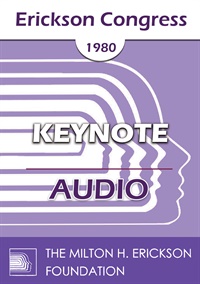
- Average Rating:
- Not yet rated
- Topic Areas:
- Keynotes | Psychotherapy | Ericksonian Hypnosis and Therapy Techniques | Ericksonian Psychotherapy | Hypnotherapy | Milton Erickson
- Categories:
- Erickson Congress 1980 | Erickson Congress | Pioneers in Couples and Family Therapy
- Faculty:
- Jay Haley, MA
- Duration:
- 1:01:07
- Format:
- Audio Only
- Original Program Date:
- Dec 05, 1980
- Short Description:
- Jay Haley reflects on his personal experiences with Milton Erickson, offering insight into Erickson’s distinctive use of metaphor, indirect communication, and strategic symptom management. He highlights Erickson’s focus on brief, practical therapy, family involvement, and adaptability to each client’s needs. The talk underscores Erickson’s lasting influence on modern psychotherapy and his pragmatic, often unconventional approach.
- Price:
- $15.00 - Base Price
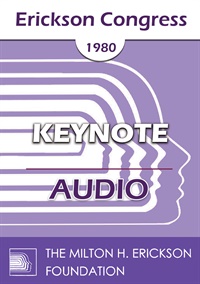
- Average Rating:
- Not yet rated
- Topic Areas:
- Keynotes | Family Therapy | Hypnosis
- Categories:
- Erickson Congress | Erickson Congress 1980 | Pioneers in Couples and Family Therapy
- Faculty:
- Carl Whitaker, MD
- Duration:
- 47:33
- Format:
- Audio Only
- Original Program Date:
- Dec 07, 1980
- Short Description:
- In this keynote, Whitaker explores family therapy by emphasizing therapist vulnerability, self-hypnosis, and authentic engagement while using co-therapy, regression techniques, and playful interventions to foster genuine healing.
- Price:
- $15.00 - Base Price







